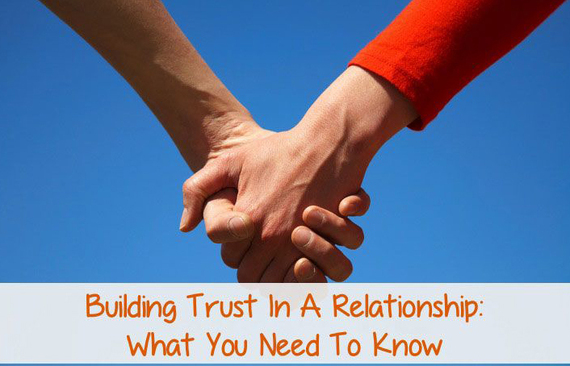
When we establish trust, we are able to let our guard down and feel comfortable with the other person. We know we can rely on them fully. When we lack trust, the repercussions can be disastrous.
Trust doesn't develop on its own. It takes serious effort from both partners. Here are some ways to develop trust and build on it together.
If each person in the relationship considers and attends to the other person, both people will feel respected and cared for. When you think in terms of "WE" rather than "I" you build the relationship and develop trust within your partnership.
Always give 100% of yourself. This doesn't mean to give up your needs and personal interests in favor of your partner's. It does mean always considering their thoughts and opinions and doing all you can to make them feel loved and respected.
People are often afraid to show the world their truest selves because they fear what others will think of them. When you are with the person you love you should feel safe showing them your true nature. By shedding your "mask," you let your partner know that you trust them fully to accept you as you are. Your partner can realize that you are as human as he or she is and it is okay to be "not perfect." If you want a happy life, you must be authentic.
Everyone has concerns, needs and fears. For the partnership to thrive, each person must feel safe to be and express who they are. Whenever you have doubts, fears or concerns about your relationship, communicate them openly with your partner.
It is important that you express your needs clearly and respectfully. Your partner cannot assume or guess what you need. They should be empowered to say "Yes," or "No." While they may not always answer with a "Yes," they will at least respect your honesty and wants.
Mean what you say and say what you mean. Words are very powerful. The words you choose can have a much deeper impact than you can imagine. Kind words make us feel comfortable. Criticisms make us feel rejected and shake our confidence. Aggressive words make us angry. Reassuring words comfort us and make us feel safe. Treat your words with respect and understand their impact.
Pay attention to non-verbal communication. Make sure your tone of voice, body language and facial expressions all convey the same thing. If your partner is sending you conflicting messages, do not assume that they have bad intentions. Just ask them what they mean. When you both communicate openly and honestly, you will develop respect and trust.
Friendship is key to a healthy relationship. Couples that don't pay attention to developing their friendship often separate. Friendship has to be nourished and nurtured regularly. Lack of friendship and emotional connection may lead one of the partners to seek intimacy in other places, resulting in emotional and even physical adultery.
To gain your partner's trust, you must be reliable. If you say you will do something, do it. If you cannot do it, be up front and honest about why not. Never leave your partner questioning your intentions.
Be faithful and committed while making the right choices. Remember that being trustworthy is an ongoing process of making an effort to sustain connection and repair disconnection.
It is important to set clear boundaries for yourself and your partner. Boundaries create trust and emotional health and are created by people who are emotionally healthy. Healthy personal boundaries require taking responsibility for your own actions and emotions, while NOT taking responsibility for the actions or emotions of others. Boundaries empower you and positively enable your partner to act in the same manner.
Marriage researcher and expert Dr. John Gottman said accepting influence from each other is a critical element in a successful intimate relationship. When partners are not willing to share their power with their spouse, it leads to unhappiness and instability in marriage. Being open to another's influence is an attitude and skill that each spouse should encourage in the other while promoting collaboration and respect.
It is normal to have conflicts and arguments, or to make mistakes in a relationship. Repairing the situation before an argument gets completely out of control (using humor, making a caring remark, saying "I am sorry," validating your partner's feelings or offering signs of appreciation) is important.
Successful couples have learned how to repair the situation before an argument gets out of control. They de-escalate conflict and manage their emotions by seeing the bigger picture. They are more concerned with being happy than being right.
Every relationship has its share of challenges. Do not run away from the difficulties that challenge you and your partner. You need to be emotionally, physically and mentally ready to embrace the challenges that come with intimacy. Recognize that each obstacle holds a lesson and an opportunity to grow together and build love and trust.
According to Dr. John Gottman, couples in a happy marriage, make at least five times as many positive statements to and about each other as negative ones. A good marriage must have a rich climate of positivity. Make regular deposits to your emotional bank accounts!
Also, respond more often with agreement to your partner's wants. Be more present in the relationship; smile more; touch more, hug more. Have more sex, more appreciation and have more shared quality time.
Trust has the ability to bring you and your partner closer together or to tear you apart. Developing and fostering trust within your relationship will help you thrive and grow together.
